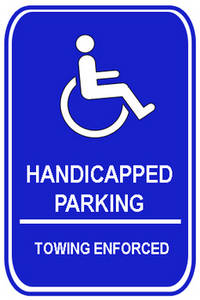In a surreal sort of way, I felt like the bad guy in a situation stripped straight from ABC’s hidden camera ethical dilemma series, What Would You Do?, hosted by John Quinones.
But I had every reason and right to have our van parked in a handicapped parking spot close to Anspach Hall. Even after I just finished running my four-mile route on Central Michigan University’s Mount Pleasant campus.

Part of me felt guilty, the other part was just itching for somebody to call me out on it. Unfortunately, nobody ever did.
But had someone ever asked how I—a runner—could get away parking in a handicap spot, here is what I was ready to tell this bold person:
Thank you so much, and it’s interesting you should ask me. I appreciate your concern. You see, my wife is disabled and I park here for her. She’s in class right now, and each week I come up here so I can help her go to the restroom during her break. After I help her, I go for a run, which I try to do at least three times each week.
I usually finish running about the same time her three-hour class is dismissed. I go up to get her on the second floor and carry her books for her—I’m chivalrous like that—and we take the elevator down and she drives her power wheelchair into our van parked here in this handicap accessible spot.
Why is she disabled? No, that’s not too personal of a question. She has Multiple Sclerosis. It’s the secondary progressive kind of this chronic illness of the central nervous system. She no longer can walk. It’s unpredictable and affects everyone differently. You see, I—the runner—also have Multiple Sclerosis. Mine is the relapsing remitting kind. Did you see how I was stumbling a little after I got done running? Right. It affects everyone differently.
Suppose that’s why I was itching for someone to call me on it. Not that I wanted a confrontation. It just felt like an ideal teaching moment for a university campus.
So if you saw something like this, what would you do?





I can relate, somewhat. I used to wonder why the person walking perfectly fine had a handicapped tag, but I figured they had a valid reason for it. Now I’m that person, and I can feel people looking at me and wondering, too.
I have been in both situations, ie both obviously and not obviously disabled, but still suffering from MS. When I was in my former capacity, it was almost a point of honor for me not to park in handicapped. However, I understand hidden disabilities like fatigue etc so I try not to judge when someone who looks capable parks in handicapped. If, though, it’s the last handicapped space available and it gets taken by someone “able-bodied,” my understanding gets tested.
Having once had the invisible disability with which I could walk fine going into the mall, but was really dragging when coming out, I understand your conundrum. Sort of.
I mean, you are certainly entitled to park there; you have the appropriate permit. But you can also not only walk, but run! AND, your wife uses a power chair. It seems that you don’t really have the fatigue issue card to play in this situation, except for a slight stumbling gait after your long run.
So, while I wouldn’t question someone with the proper credentials to park there, you might ask yourself: Do I/we really need this spot?
Good question and a tough one. I am always wanting to approach ‘seemingly’ able bodies people who take those spaces and ask about their disability. Parking is probably the most abused privilege (if we can call it that) of all. If you need it, tackle the space. But if you are entitled to it and don’t need it, leave it for someone who does. If everyone did that, there would probably be plenty of spaces available.
Merry Christmas. May your lives continue to be filled with blessings and miracles.
Dan, you did open the door here and I am not so sure it is exactly a black and white teaching moment. Seems it is more about personal choice.
Caregivingly Yours, Patrick
Hi, Patrick. You’re correct and it really isn’t exactly a black and white teaching moment. Truly the teaching moment I was thinking of was to teach others about the realities of Multiple Sclerosis and how it has the relentless power to impact people in totally different ways.